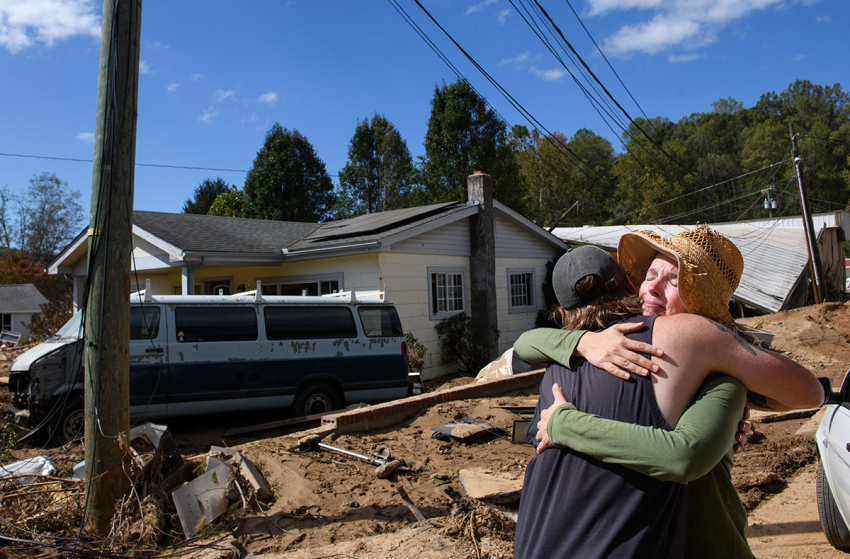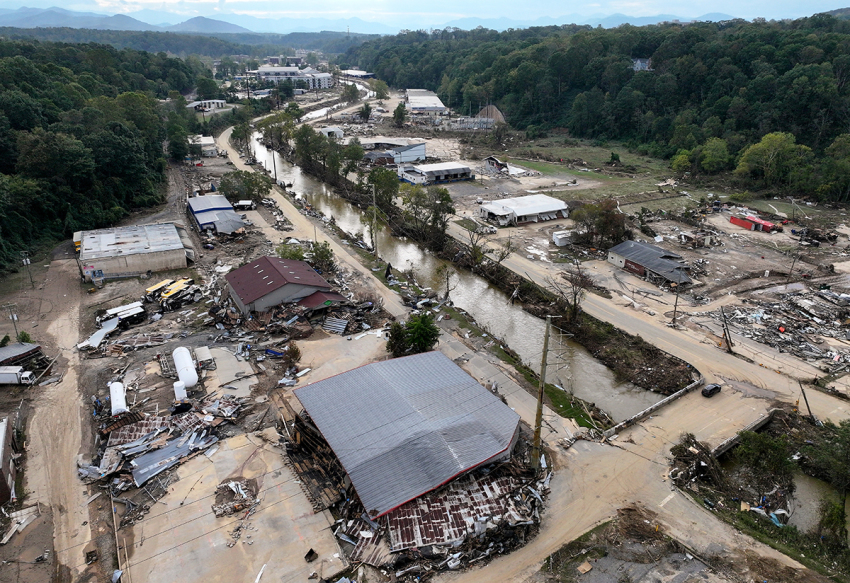Franklin Graham says Americans must help each other amid storm devastation, trust in God’s goodness
'We all are going to have storms in life'

Samaritan's Purse CEO Franklin Graham told The Christian Post that God is faithful amid suffering and that Americans must rely on each other after the recent hurricane devastation in the southeastern United States that afflicted his hometown.
He also advised Americans against waiting for the government to save them in the wake of the damage from Hurricane Helene, which tore through a corridor extending from the Florida panhandle into Appalachia last week.
The storm left wide swaths of death and destruction, especially in Graham's native western North Carolina, where his nonprofit Samaritan's Purse is based in Boone.
The relief organization has been using helicopters to carry food, water and medical kits to some of the state's remote western counties, Graham told CP. They are also responding in Florida, Georgia and Tennessee. Earlier this week, Graham toured the devastation with former President Donald Trump in Valdosta, Georgia.
'Your own backyard'
Graham noted the surreal nature of the fact that Samaritan's Purse, which ministers to devastated populations around the world, is now helping people in its own neighborhood. He said his own house in Boone continues to be without electricity, and that the media is not able to adequately portray the devastation in western North Carolina.
"I think it's much worse than what people see on television," he said. "The smells and so forth, you don't get that through a television set; the filth that people are having to live in and work in and try to survive in."

Boone is a college town about 100 miles northeast of the hurricane's epicenter of destruction in Asheville, where Graham was born. Dead bodies have reportedly been found in the trees in the Asheville area, and more than 1,000 people remained unaccounted for earlier this week, according to the New York Post.
Montreat, a town less than 20 miles east of Asheville, where Graham's father lived most of his life, was among the many small mountain communities Helene decimated, which brings the crisis close to home for him.
According to sources who spoke to CP, the campus of Asheville Christian Academy where members of Graham's extended family attended, was largely destroyed by the unprecedented swell of the Swannanoa River, which carried entire houses away in its raging tides after the tropical storm hit.
"We work all over the world, and then all of a sudden, now you're working in your own backyard," Graham said. "But I think the biggest story about this is neighbors helping neighbors. That's the American spirit, and it's always been that way in a crisis."
'Nobody's ever seen anything like this'
When asked to comment on reports circulating on social media that federal authorities are blocking civilian attempts to aid in rescue efforts, Graham was reluctant to criticize the government response, but emphasized the importance of Americans helping each other regardless of authorities.
"When you have a situation like this, the government is always blamed for coming slow," he said. "I've heard that the FEMA money is not there because it was given to migrants. I don't know about that, but the state of North Carolina has done an incredible job so far with the Department of Transportation trying to open up roads."
He noted many of the roads in parts of western North Carolina have been destroyed by mudslides and reduced to gullies gushing into a nearby river, which hampers aid efforts.
Graham also noted the unprecedented nature of the catastrophe, which some have dubbed a "1,000-year event."
"Nobody's ever seen anything like this," he said. "I've lived here my whole life, I've never seen anything like this."
Graham further claimed "it's hard to know" if the response from the Biden administration to the disaster has been adequate, but welcomed Vice President Kamala Harris recently offering $750 gift cards to those most afflicted by the storm's devastation.
"I can promise you anything that is given is going to be a help," Graham said. "You don't want to criticize — in a time of crisis like this — the president or his administration, because I'm sure they're doing the best that they possibly can."
"The government cannot solve all of these problems," he also said, adding that "people are going to have to get out there and get to work" regardless of the government's response.
"Hopefully, somebody like Samaritan's Purse will be there to help you," he said. "But still, if people want to sit back and wait for the government to do everything, it's not going to happen."
Graham noted workers with Samaritan's Purse are focusing on simple things such as cutting trees off houses, putting tarps on leaky roofs and even getting Benadryl to people who have been stung by bees that became aggressive after their nests were flooded.
He said one woman was reduced to tears of gratitude when one of their chaplains provided her with two gallons of clean water.
'The hope we have'
Graham offered a message of hope to those who doubt God's goodness amid catastrophe and question why He allows suffering.
"A lot of people, when there's a crisis like this, ask why," he said. "Why did God allow it? He's a God of love: why did God allow this? And that's a question that maybe we've all asked ourselves at some point in life. But we know from the Bible that God loves us, and He cares for us."
Graham said many types of storms can descend in life, and there is not always an easy answer, but God is willing to remain with us through all of them.
"We all are going to have storms in life, whether it's this storm — or it could be a financial storm, it could be a health storm — but we have storms in life, and the Bible tells us that if we put our faith and trust in Christ, that not only will He get us through this life, He will take us all the way to Heaven to be with Him one day."
"And we'll be safe and secure in His arms, for those that put their faith and trust in Him," he added. "So that's the hope we have. And I just want all of our team to be able to share God's love with everyone we meet and everybody we help."
Jon Brown is a reporter for The Christian Post. Send news tips to jon.brown@christianpost.com



























